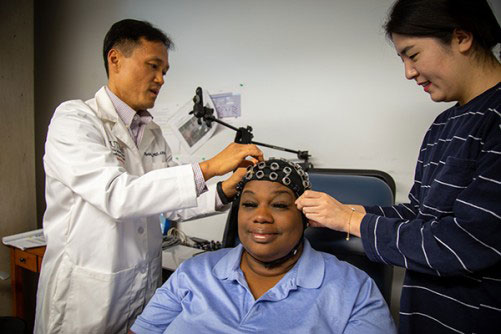
Knee pain sufferer Deborah Brown is helping UTHealth’s Ahn and his colleague Lindsey Park evaluate an innovative pain relief treatment Photograph by Maricruz Kwon/UTHealth
Hyochol “Brian” Ahn, PhD, ANP-BC, an associate professor with Cizik School of Nursing at The University of Texas Health Science Center at Houston (UTHealth), believes knee pain can be stopped by administering tiny electrical charges to the brain’s primary motor cortex. The brain is an electrochemical organ that processes pain, according to Ahn, and his team is trying to desensitize the areas tied to knee pain. This treatment has the potential to improve the self-management of pain, decrease health expenditures, and improve quality of life for patients.
Study participants, who range in age from 50 to 85 with symptomatic knee osteoarthritis, wear a battery-powered cap that relays a weak current between a positive and negative electrode. There are 15 20-minute sessions over 3 weeks. To see if the brain stimulation works, participants are asked to complete a questionnaire for which they rate their pain on a scale of 1 to 100 before and after the treatment. Researchers will also review medical images of the participants’ brains for possible changes. To establish the validity of the experiment, Ahn is creating a control group comprised of volunteers who do not receive enough brain stimulation to make a difference.
The clinical trial, Self-Administered Transcranial Direct Current Stimulation for Pain in Older Adults with Knee Osteoarthritis: A Phase II Randomized Sham-Controlled Trial (NCT04016272), runs through July 31, 2022.







